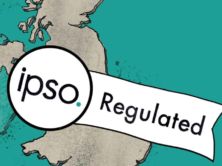
(Credit: Cristian V. via Flickr)
A man who identified as a victim of a sexual assault complained about five Scottish news outlets’ articles about his case. He told the UK print regulator Independent Press Standards Organisation (IPSO) that he was upset for being identified in the articles as a victim when the police had told him his name would remain private.
The Daily Record and the Times got in trouble with IPSO for naming the man, but the three other outlets – the Herald, the Scotman and Edinburgh Evening News – were cleared of his complaints. The stories in question reported that the woman accused of sexually assaulting him was found not guilty.
IPSO explained that it didn’t matter if the verdict was not guilty because the man self-identified as a sexual assault victim and its standards don’t allow the naming of sexual assault victims.
The Daily Record said that normally Scottish media does not identify possible sexual assault victims, but the newspaper’s editors pointed out that no order had been issued that banned the identification of the man. And, since the judge didn’t rule the woman was guilty of sexual assault, it was OK to name him, the newspaper thought.
The Times published the man’s name in its report for its online and Scottish print edition. Unlike the Record, the Times “conceded” it broke IPSO’s guidelines but argued like the Record that naming the man was justified for similar reasons — he was IDed in open court and the sheriff in the case disagreed with the case’s filing, IPSO said.
However, IPSO said that it didn’t matter if the court didn’t ban naming the man; IPSO’s standards ban the naming of victims no matter what happens in any court case or what the law says. There was no public interest to justify going against the code’s ban and the newspaper could have reported on the case without naming the man. IPSO explained why it’s important to protect potential victims:
“The protection of the identities of people who make allegations of sexual assault is of great importance to society generally, and not just to those individuals at the centre of ongoing cases, as it is essential in ensuring that other victims are not dissuaded from reporting sexual offences to the police, for fear of unwanted publicity.
Even thought the court found the accused not guilty, the man’s identity should have still been protected. IPSO explained how its code applies:
“The provisions of the Code apply as soon as a person complains that they are a victim of a sexual assault, regardless of whether the defendant is acquitted or the allegation is later withdrawn. The protections of Clause 11 exist independently of legal proceedings, and a later finding by the court that a defendant is not guilty is not relevant to whether the accuser is covered by Clause 11, although this could be relevant to the Committee’s consideration of whether identification was adequately justified.”
The man wanted an apology and for the Record to promise it wouldn’t name possible sexual assault victims in the future.
Though the Daily Record never put the article on its website, the editors said they would contact anyone who had republished the article’s information and get it taken down.
While agreeing the Daily Record‘s and Times’s story invaded the man’s privacy and broke guidelines on reporting on sexual assault victims, IPSO dismissed the man’s complaints about accuracy, right to reply and harassment.
The Daily Record is now required to publish IPSO’s ruling in the first 15 pages of the print edition but not on its website. The Times had to publish the ruling in its first 21 pages and online. A spokesperson for the Times told iMediaEthics the paper printed the ruling last week.
The same man complained about the Herald‘s, the Scotman’s and Edinburgh Evening News‘ articles on him and the court case. The Herald didn’t name him but did provide enough information for readers to figure out who he was, he said. In both of those cases, however, IPSO ruled that the Herald‘s and Scotsman‘s articles didn’t make him identifiable. IPSO dismissed his complaints against the newspapers for reporting on sexual assault victims, accuracy, right to reply, privacy and harassment.
The Record declined to comment. The Scotsman’s Donald Walker referred iMediaEthics to its editor Ian Stewart for comment but he is on vacation. The Evening News has not responded yet to our inquiry for comment on the ruling.,







Comments Terms and Conditions